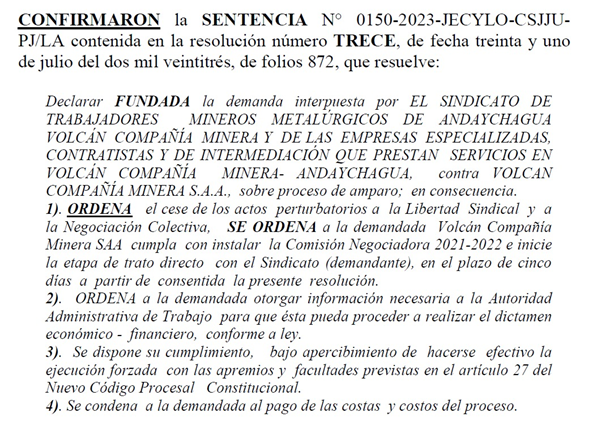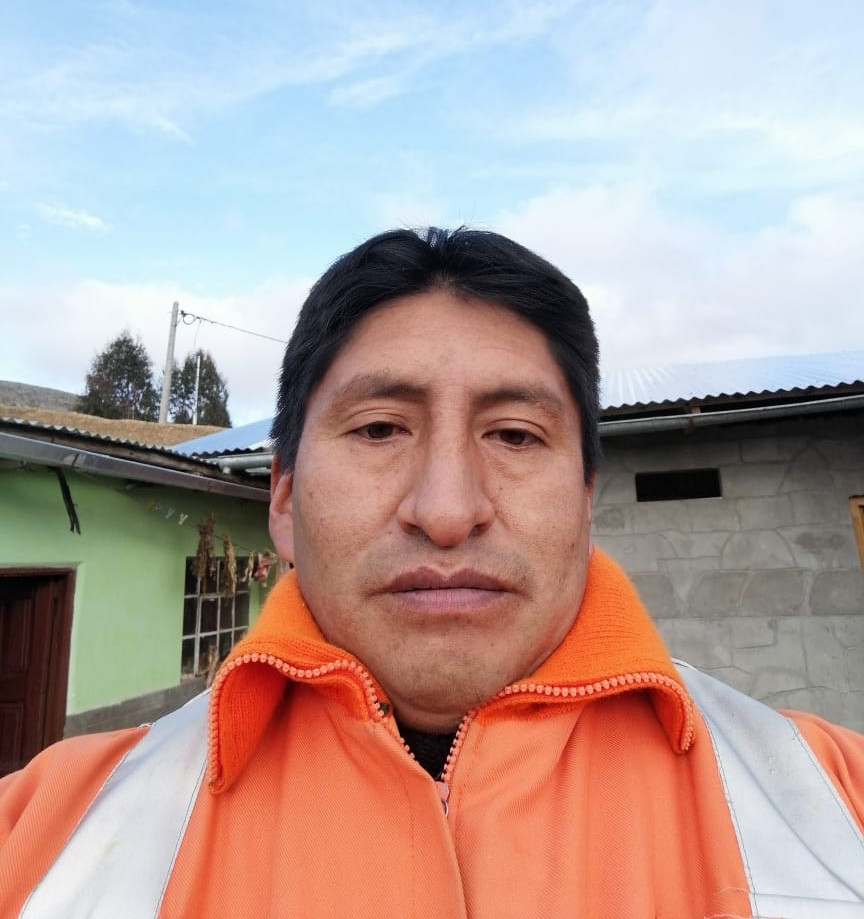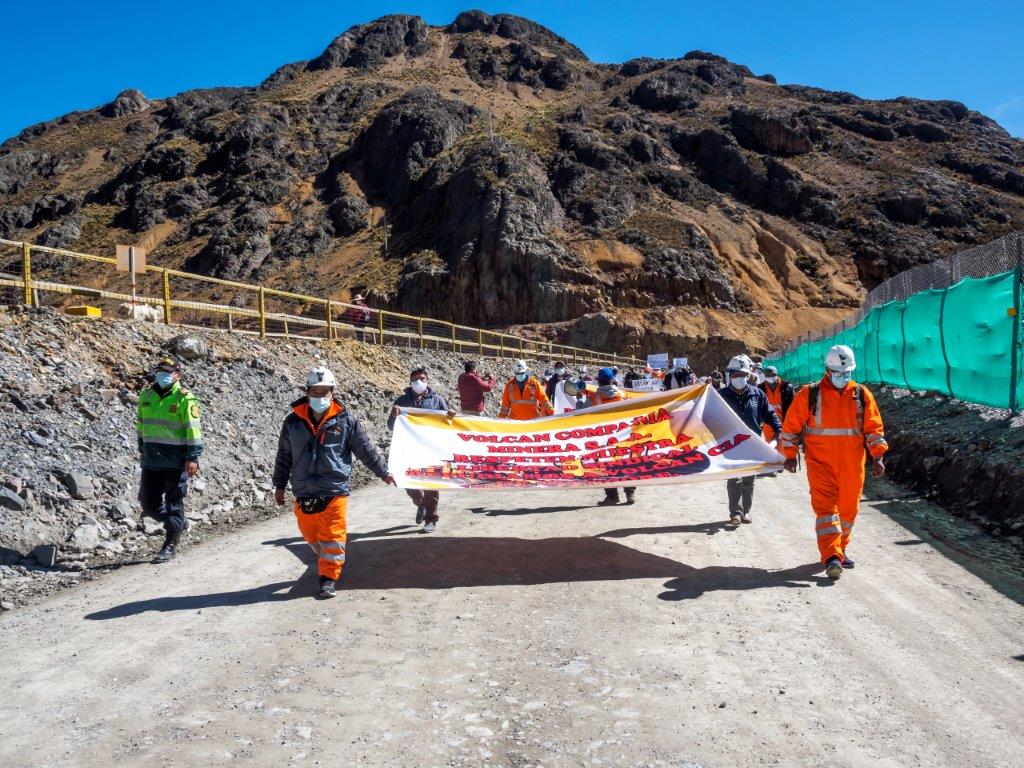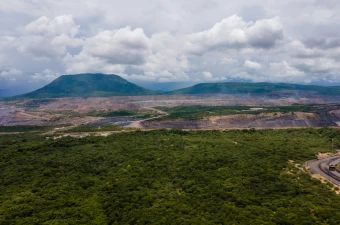Peruvian miners' union triumphs in fight for union freedom
On appeal, the Peruvian court has rejected Glencore’s bid and ordered for the multinational’s mining company Volcan to stop its disruptive acts against freedom of association and collective bargaining. Within five days from 23 October, the company that owns the Andaychagua mine in Peru must comply with the earlier ruling, which awarded the Andaychagua mine union the right to negotiate collective bargaining agreements at the Andaychagua mine, which mines silver and zinc, critical minerals crucial to the worlds’ energy transition.

It was a brave decision by permanent employees at Peru's Volcan mine Andaychagua to open up their union in 2021 to their colleagues working through temporary employment agencies. The union submitted a request to negotiate a new collective agreement with better working conditions on behalf of permanent miners as well as temporary workers.
However, mining company Volcan refused to negotiate on the union's collective agreement proposals. To the contrary, Volcan and its parent company Glencore, worked against the union in every possible way.

Trade union leader Alex Tinoco welcomes the decision of the court:
“ Improving the poor ventilation and insufficient protective equipment is urgent, and other labour conditions as well. Pressure on workers is extremely high. We're working deeper and deeper in the mine.
But, we do hope that with this court decision, Volcan will come to the negotiation table to discuss a new collective bargaining agreement."
Complaint to the EU
Within a few weeks, the European Union will be discussing the complaint filed in March 2022 by CNV Internationaal together with trade union organisations from Peru and Colombia. These trade unions represent workers producing the coal and metals that play such a crucial role in the European Union’s energy supply. It was the first complaint filed ever with the EU's Single Entry Point, in a quest to make precarious working conditions in the mines visible.
>> CNV Internationaal presents complaint in EU Parliament
Outsourcing
Since 2008, Peru has had an outsourcing law to reduce costs and make the Peruvian industry even more competitive internationally. Nowadays, more than 70% of the miners in the metallurgical sector in Peru are temporary outsourced workers, having to renew their contract every few months.
Companies are only legally responsible in complying with labour guarantees for miners who have direct contracts. This means outsourced workers "don't count" when it comes to company responsibility.
Human rights risks
The terms and conditions of employment for outsourced miners are much worse than those with permanent contracts, despite doing the same work under the same dire conditions (heavy and risky work, deep under the ground, in temperatures well over 40°, with poor ventilation and insufficient protective equipment). The miners work in shifts of 14 or 21 consecutive days in the remote mines high in the Andes. For outsourced miners, there is not even decent dormitory to stay overnight during work weeks.
Outsourced workers have to renew their contracts every few months with the employment agency. This vulnerable and short-term position makes it even harder for outsourced miners to be able to organise in a trade union.
Does Glencore know?
As for Glencore, the company creates an illusion of compliance. The company’s website promises compliance with the ILO's International Conventions of Human Rights and the Fundamental Declaration of Labour Principles and Rights at Work. Glencore also says that they have established a protocol to guarantee labour rights for the outsourced workers of their suppliers.
However, in practice, our experience with miners and their unions is that Glencore avoids responsibility by passing these responsibilities for compliance over to the sub-contracting companies. In doing so, the sub-contractors are left having to ensure correct working conditions and labour rights for the outsourced workers.

As early as January 2022, the Peruvian government confirmed the union's right to negotiate on behalf of workers at the Andaychagua mine; however, Volcan-Glencore continued to refuse to enter into dialogue.
Around Christmas 2022, the union subsequently started a strike that would last 60 days, during which 2 miners were dismissed.
Investors
Large investors, such as Dutch pension fund ABP, also adjusted their policies, which included human rights policies at Glencore. In an official statement on 15 October 2021, ABP announced that it would stop investing in Glencore.
ABP exits Glencore investment over human rights concerns | News | IPE
Complaints to EU
CNV Internationaal filed a complaint about the case with the European Union's trade agreement complaints mechanism (Single Entry Point), being the first organisation ever in doing so.
Learn more
Publication date 25 10 2023


